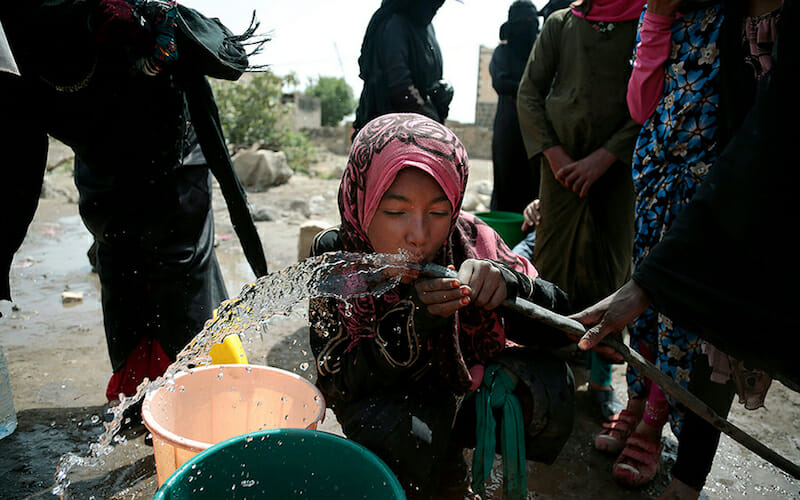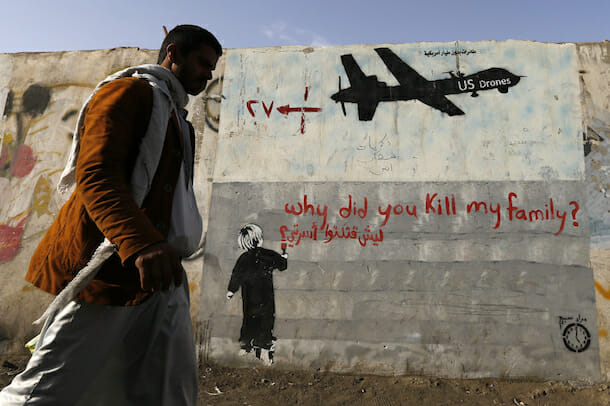
Millions at the Brink: The World’s Responsibility in Yemen
In Yemen, the poorest country in the Middle East, there has been a civil war raging since Shia Houthi rebels took over the country’s capital in 2014. After President Saleh was ousted in 2012, the country became unstable and progressed towards war. With the Houthis being ideologically opposed to many of Yemen’s neighbors, the surrounding countries quickly became concerned for their own stability and control in the region. What had once been a domestic uprising soon became a massive and brutal international conflict.
In order to retain control of his country, Abd Rabbu Mansour Hadi, the current President of Yemen, enlisted the help of Saudi Arabia to help defeat the rebellion. The Saudis were quick to intervene, and have been blockading and bombing the country for the past two years. Helping the Saudis since the beginning of the conflict has been a coalition of Gulf States, as well as the United States.
The primary issue at hand is the way the coalition has been fighting. The conflict has been particularly cruel for the civilians caught in the crossfire, and there is evidence that the Saudi-led forces have violated international law. In fact, on the day that this article was written, a coalition airstrike on an open-air civilian market killed 25 civilians, including some children.
This is just the most recent from countless atrocities committed against the people of Yemen. It would be irresponsible to just chalk these crimes up to being unintentional ‘collateral damage.’ It is clear that the Saudi government is intentionally authorizing indiscriminate attacks on civilian positions. There is no tactical strategy; the Saudi-led coalition strikes in Yemen are just another example of sectarian violence.
In 2001, the International Commission on Intervention and State Sovereignty (ICISS) was formed. This panel of international experts focused on preventing genocides and other crimes against humanity, and did so by consulting with governments, NGOs, IGOs, universities, and think tanks. What resulted was the commission’s major report, The Responsibility to Protect, in December of 2001. It outlined the responsibility of states to protect their own populations from “mass atrocities,” and emphasized the role that the international community must sometimes play in fulfilling that responsibility when a state is no longer able to do so themselves.
In the ICISS report, it is clearly outlined in the basic principles: “Where a population is suffering serious harm, as a result of internal war, insurgency, repression or state failure, and the state in question is unwilling or unable to halt or avert it, the principle of non-intervention yields to the international responsibility to protect.”
It is estimated that at least 10,000 civilians have been killed in Yemen since 2015. Over a million suffer from cholera infection; more than 2,135 people have died from cholera, most of them children. 5,000 become infected with the disease daily. Tens of thousands more are injured or stricken with other diseases and millions are starving. Half a million children, all under the age of five, are severely malnourished. These casualties are directly attributable to the Saudi’s blockade of Yemen. An interactive editorial on the Saudi blockade in Yemen can be found here.
As stated in the ICISS report: “State sovereignty implies responsibility, and the primary responsibility for the protection of its people lies with the state itself.”
With the facts laid out, it is clear that the state of Yemen has failed to protect its population, and that the sovereignty of the state is compromised. Instead of being able to protect its citizens, the country has delegated control to the Saudi military — somewhat involuntarily — in order to restore power.

By being delegated the power to fight the Houthis on Yemen’s behalf, the Saudi government and their coalition have assumed the responsibilities that come with maintaining a sovereign state. Unfortunately, the way in which the Saudi-led coalition has gone about fighting the rebels does not appear to resemble justified intervention, but instead seems to be a clear and flagrant violation of international and human rights law. By taking control and abusing it in a violent, sectarian way, the Saudi-led coalition’s war can now only be considered as an unnecessary, unilateral, illegal military action. The United Nations has even called the war in Yemen an “absurd” war with “no military solution” after 68 civilians were killed in a single day.
With one country effectively failing to protect their population, and another country adding to the horrifying conditions in which the resident population must survive, there is a clear need for the international community to react.
The second element of the ICISS report states: “The responsibility to react: to respond to situations of compelling human need with appropriate measures, which may include coercive measures like sanctions and international prosecution, and in extreme cases military intervention.”
In the case of Yemen, there is an inarguable responsibility to react. Watchdog organizations, the UN itself, and governments such as the United Kingdom are calling the crisis in Yemen the “worst humanitarian crisis in the world,” and the coercive measures listed in the ICISS report are appropriate for the situation. In fact, sanctions and international prosecution are likely the only measures needed to force Saudi Arabia to, at the very least, be more humanitarian in their campaign in Yemen, and the international community could do it in a week.
Invoking the Responsibility to Protect, sanctions passed by the United Nations Security Council could immediately punish the Saudi-led coalition states for their recklessness in the region, providing them with proper incentive to follow international law when fighting their war. For example, cutting off billions in US aid to Saudi Arabia by way of an arms embargo–unless they lifted the food and water blockade to Yemen–would be one of many simple steps to relieving the country.
In fact, there is already political will brewing in the United States to pressure the Saudis, and action by the UN Security Council would just act as an even firmer condemnation. Simple, effective actions have the potential to act as strong catalysts for change. After all, the famine in Yemen is completely man-made, and can be easily reversed.
Though there is certainly more political will than there was a year ago, there is still major hesitation from the international community to call out Saudi Arabia for its crimes, and it is likely due to several conflicts of interest. Taking the United Kingdom as an example: it’s been reported by The Guardian that UK-made cluster munitions, which are illegal to use under international law because of their tendency to kill civilians, have been deployed in Yemen by the coalition. In addition to that, Saudi soldiers have been receiving training and intelligence support from British troops.
In the past two decades, there have been multiple opportunities for the Security Council to take quick action towards maintaining international peace and security. In fact, the Responsibility to Protect was specifically intended to give the international community a framework to do just that. After the failure to react in Rwanda, the military failure in Somalia, the questionable nature of the involvement in Kosovo, and the failure to protect thousands in Bosnia, the Responsibility to Protect was supposed to be an answer to all these failures; a way to prevent the next mass atrocity.
Unfortunately, whether it be due to hesitation, lack of political will, or lack of backbone, the international community has failed to follow the doctrine of the Responsibility to Protect multiple times. It is possible that the situation in Yemen will go down in the history books as the next one of those failures. Once again, the international community has a responsibility to act. Countries must put aside their need to be politically correct towards Saudi Arabia, and they need to force them to a more appropriate humanitarian position.
Several years ago, there was a responsibility to prevent the country’s instability from going off the deep end. Now, there is a responsibility to react; a clear need to help the helpless and to stop a needless, horrifying proxy war. When all is said and done, there will also be a responsibility to rebuild, and if there is no effort to at least reduce the impact of the conflict, that responsibility will come with a heavy burden of guilt. It is also worth mentioning the common price tag that comes with political instability in the Middle East, with examples such as the rise of ISIS coming to mind.
If nothing is done, tens of thousands more civilians will continue to die as direct result of this conflict, and millions more will die from disease and starvation. Time will only tell whether or not the international community is capable of making the right decisions in time. If not, then the example of Yemen may just become another paragraph in the next Responsibility to Protect report, just like the examples of Somalia, Bosnia, Kosovo, and Rwanda.
One can only hope.
This article was written in cooperation with The Canadian Centre for the Responsibility to Protect. The CCR2P is is a non-profit, non-partisan research organization which aims to promote scholarly engagement and political implementation of the R2P principle.

